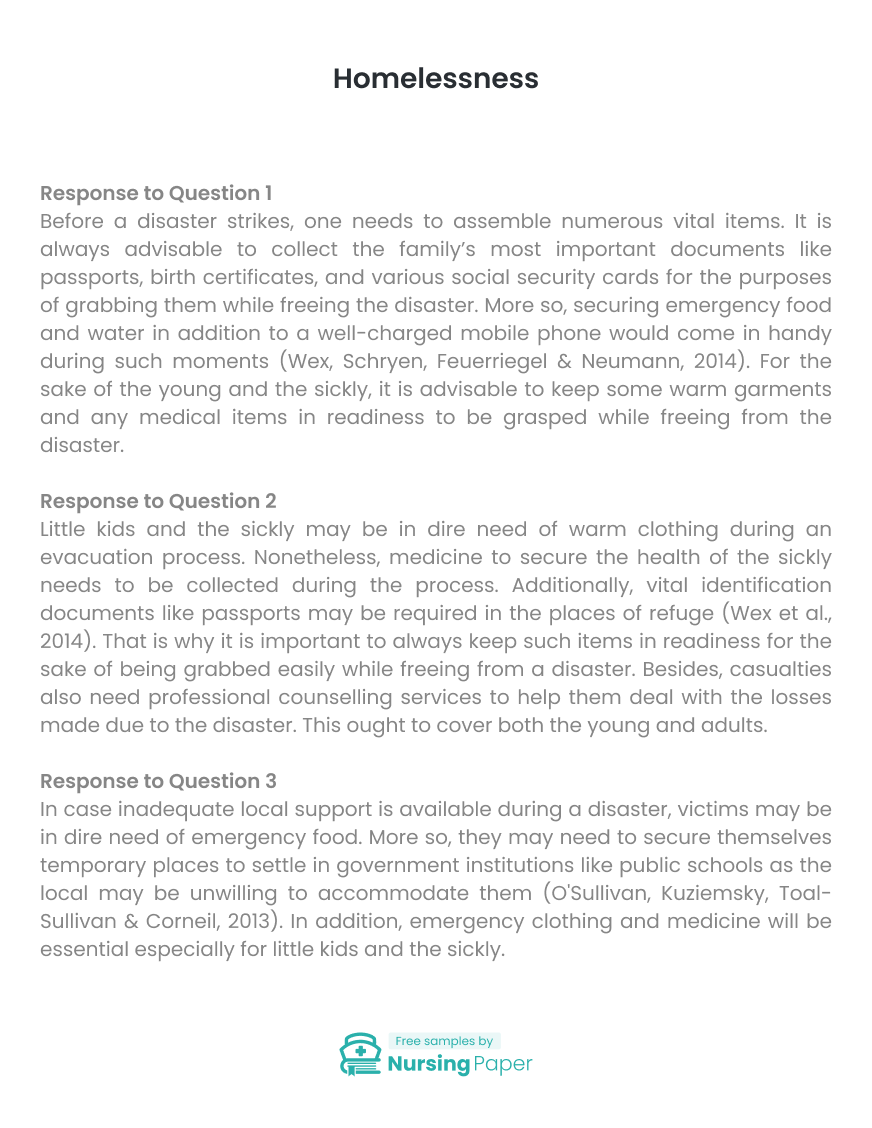
Homelessness
Response to Question 1
Before a disaster strikes, one needs to assemble numerous vital items. It is always advisable to collect the family’s most important documents like passports, birth certificates, and various social security cards for the purposes of grabbing them while freeing the disaster. More so, securing emergency food and water in addition to a well-charged mobile phone would come in handy during such moments (Wex, Schryen, Feuerriegel & Neumann, 2014). For the sake of the young and the sickly, it is advisable to keep some warm garments and any medical items in readiness to be grasped while freeing from the disaster.
Response to Question 2
Little kids and the sickly may be in dire need of warm clothing during an evacuation process. Nonetheless, medicine to secure the health of the sickly needs to be collected during the process. Additionally, vital identification documents like passports may be required in the places of refuge (Wex et al., 2014). That is why it is important to always keep such items in readiness for the sake of being grabbed easily while freeing from a disaster. Besides, casualties also need professional counselling services to help them deal with the losses made due to the disaster. This ought to cover both the young and adults.


Response to Question 3
In case inadequate local support is available during a disaster, victims may be in dire need of emergency food. More so, they may need to secure themselves temporary places to settle in government institutions like public schools as the local may be unwilling to accommodate them (O’Sullivan, Kuziemsky, Toal-Sullivan & Corneil, 2013). In addition, emergency clothing and medicine will be essential especially for little kids and the sickly.
Response to Question 4
Victims of disasters suffer from various resource deficits. They lack adequate food, water and clothing (O’Sullivan et al., 2013). They may also lack a place to settle down as their homes may be completely destroyed by the disaster. Additionally, such people may suffer from various knowledge deficits like how to best respond to the disaster once it strikes. Lack of appropriate professional knowledge on how to handle the sickly during the time when the disaster strikes may also affect them. Worse still, they lack adequate ways of coping with the results of the disaster (Gist & Lubin, 2013). Thus, counselling services play an integral role in aiding them to recover.
Response to Question 5
The community nurse can help to address knowledge and resource deficits during disasters. In essence, the nurse may offer their professional services to the sickly. These might include, but not limited to, offering first aid to the injured before the arrival of reliable medical health (O’Sullivan et al., 2013). Their connections in the health sector may also play a significant role. That can happen when they make deliberate moves to source medicines for the sickly and other vital medical items.

Response to Question 6
The top priority knowledge deficit concern during disasters is usually how to respond to the disaster once it strikes (Wex et al., 2014). For example, how to respond to a fire alarm in case fire breaks out. As such, good response to disasters reduces the number of casualties significantly.
1. Gist, R., & Lubin, B. (2013). Response to disaster: Psychosocial, community, and ecological approaches. Routledge.
2. O’Sullivan, T. L., Kuziemsky, C. E., Toal-Sullivan, D., & Corneil, W. (2013). Unraveling the complexities of disaster management: A framework for critical social infrastructure to promote population health and resilience. Social Science & Medicine, 93, 238-246.
3. Wex, F., Schryen, G., Feuerriegel, S., & Neumann, D. (2014). Emergency response in natural disaster management: Allocation and scheduling of rescue units. European Journal of Operational Research, 235(3), 697-708.



The download will start shortly.

The download will start shortly.
 Subject:
Medicine
Subject:
Medicine  Number of pages: 4
Number of pages: 4  Subject:
Health and Social Care
Subject:
Health and Social Care  Number of pages: 2
Number of pages: 2  Subject:
Medicine
Subject:
Medicine  Number of pages: 6
Number of pages: 6  Subject:
Medicine
Subject:
Medicine  Number of pages: 3
Number of pages: 3  Subject:
Health and Social Care
Subject:
Health and Social Care  Number of pages: 7
Number of pages: 7  Subject:
Nursing
Subject:
Nursing  Number of pages: 21
Number of pages: 21  Subject:
Health and Social Care
Subject:
Health and Social Care  Number of pages: 6
Number of pages: 6  Subject:
Health and Social Care
Subject:
Health and Social Care  Number of pages: 4
Number of pages: 4  Subject:
Health and Social Care
Subject:
Health and Social Care  Number of pages: 2
Number of pages: 2  Subject:
Medicine
Subject:
Medicine  Number of pages: 4
Number of pages: 4  Subject:
Health and Social Care
Subject:
Health and Social Care  Number of pages: 8
Number of pages: 8  Subject:
Medicine
Subject:
Medicine  Number of pages: 6
Number of pages: 6  Subject:
Medicine
Subject:
Medicine  Number of pages: 2
Number of pages: 2  Subject:
Health and Social Care
Subject:
Health and Social Care  Number of pages: 2
Number of pages: 2 
